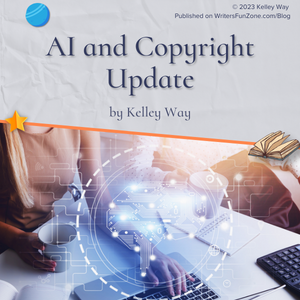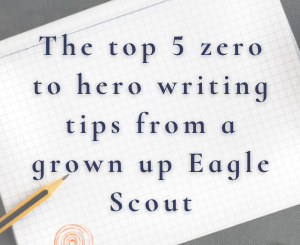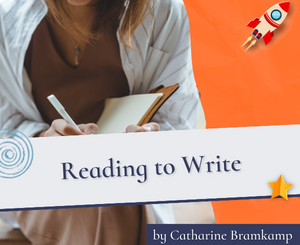AI and Copyright Update by Kelley Way
 Let’s welcome back monthly columnist Kelley Way as she shares with us “AI and Copyright Update.” Enjoy!
Let’s welcome back monthly columnist Kelley Way as she shares with us “AI and Copyright Update.” Enjoy!
***
I wrote about the issues surrounding AI and copyright law a few months ago, but as with any new and exciting technology, the landscape is changing rapidly, so I felt an AI and Copyright update is in order.
What the Copyright Office Has to Say
In my previous article, I discussed whether AI-generated content could be protected by copyright law in the first place.
The Copyright Office addressed that question in a recent update to the Federal Register, stating that anything created by a machine cannot be protected by copyright.
The Copyright Office has a long-standing policy of only granting copyright protection to works created by humans, so this decision is consistent with their previous rulemaking.
(Before machines, there were questions about paintings done by elephants in zoos and a semi-famous “monkey selfie” case in the courts involving a monkey who found a camera in the jungle and, well, took a selfie. PETA brought the case to the courts on behalf of the monkey and lost rather spectacularly.)
The Copyright Office also addressed the question of human authors using AI as a tool in their creative process or creating content in conjunction with AI-generated content.
In these cases, the content contributed by the human can be protected by copyright, but the content contributed by the AI program cannot.
When registering a work with the Copyright Office, the applicant must identify any part of the work that was AI-generated, and that part of the work will not be protected by copyright.
This means that authors wanting to use AI-generated content need to be very thoughtful and strategic in how they do so since that part of the work will not be protected.
The Problem With “Training”
The use of copyrighted content in AI databases is still a very contentious issue.
Several lawsuits have been filed against various AI software developers over their use of copyrighted content in “training” the AI program.
The AI developers, for the most part, are arguing that this falls under the fair use doctrine and therefore, permission is not needed.
It’s possible that Congress will issue legislation to resolve this issue, but most likely, a decision will be reached by the courts before then.
While the copyright owners are certainly upset about their content being used without permission (or payment), the bigger issue for them is that many AI programs do not yet have filters to prevent copyrighted material from making it into the content it generates.
To be fair, creating such a filter is likely an extremely complex task since the program will have to take into account the copyright status of the content it is using, the final product it is being asked to generate, and whether any fair use principles apply (and even humans struggle with that last one).
So while this seems like a simple and straightforward answer, it will likely be some time before it can be successfully executed. And until such a filter is in place, the presence of copyrighted material in AI-generated content is likely the biggest impediment to the software developers’ fair use argument.
Impacts on the Market
Last but not least, the impact of AI-generated content on the market for human labor is still a concern, but it hasn’t received the same headlines as the issues outlined above.
Creatives are still encouraged to read their contracts carefully to make sure the content they create is not used to train AI programs to replace them down the road.
(It should also be noted that while AI software has proven itself capable of many things, it has yet to prove itself truly creative, so machines will not run Hollywood anytime soon.)
I hope you enjoyed this latest AI and copyright update. If you would like to learn more about copyright and AI and how it could impact you, please email me at kaway@kawaylaw.com.
***
Want to read more articles like this one Writer’s Fun Zone? Subscribe here.
***
ABOUT THE AUTHOR
Kelley Way was born and raised in Walnut Creek, California. She graduated from UC Davis with a B.A. in English, followed by a Juris Doctorate. Kelley is a member of the California Bar, and an aspiring writer of young adult fantasy novels. More information at kawaylaw.com.







